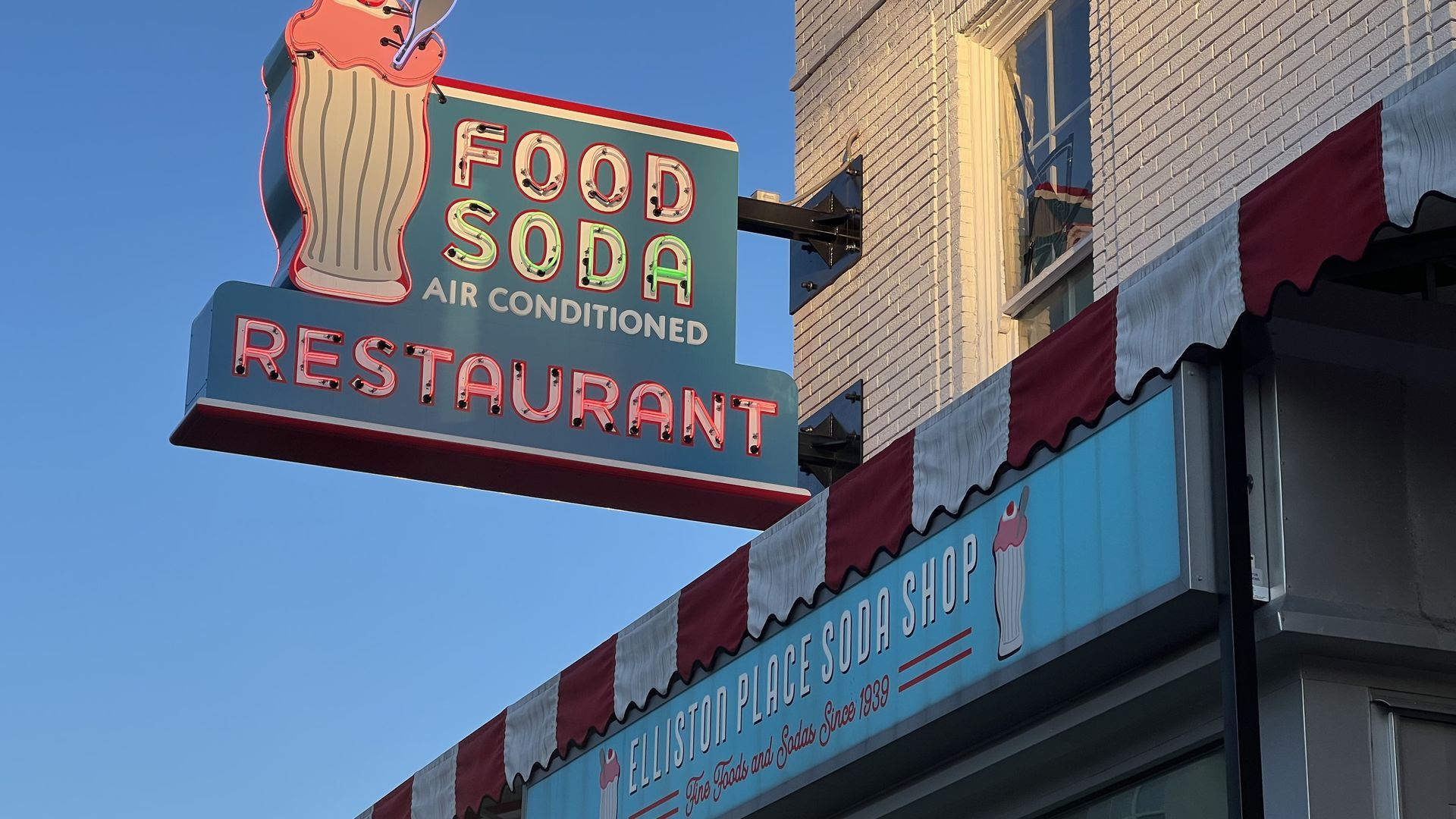Nashville's big food fight
Add Axios as your preferred source to
see more of our stories on Google.

Elliston Place Soda Shop. Photo: Adam Tamburin/Axios
Another wave of iconic Nashville restaurants exited the stage this year, reviving a familiar debate over the evolution of the city.
- Many longtime residents and business owners say the loss of understated institutions such as Rotier's and Hermitage Cafe chips away at the city's identity.
Why it matters: Tributes to bygone restaurants and bars parallel the broader discussion about the effects of meteoric growth on Nashville. Whether framed in terms of biscuits and gravy or party buses and bridal showers, the central issues remain the same.
- Growth brought many high-end options and drove interest in a wide range of cuisines, but also challenged many mainstays.
- "Nashville has done a remarkable job of attracting big corporate businesses and lots of tourists, but has done a pretty lousy job for people who have lived here a long time," Bob Bernstein, the owner of Fido and Bongo Java, tells Axios.
- "It's losing a lot of the flavor of the city."
Driving the trend: Bernstein sees the restaurant industry as a proxy for the city itself. Hillsboro Village was a quieter section of the city when he opened Fido there in the 1990s.
- Driven by its dining scene, the neighborhood around Fido exploded.
- Restaurants similarly generated interest in other neighborhoods across the city.
Yes, but: As growth surged around them, so did real estate values and rent. Many restaurants shuttered simply because they couldn't afford to stay.
- "We're all getting priced out of areas that we helped build," Bernstein says.
What they're saying: Marcia Jervis, who owned the Mad Platter in Germantown with her husband Craig for 27 years before they closed in 2016, tells Axios that Nashville's growth is a "double-edged sword" for the industry.
- On the one hand, waves of new residents coming for high-paying jobs set the stage for an influx of new, quality restaurants.
- On the other hand, she says, newcomers are less likely to be loyal to the old standbys.
- "I don't know if we have ownership of restaurants anymore," Jervis says. "It just feels like we're sitting around waiting for the next restaurant to come out."
Zoom in: Hermitage Cafe closed abruptly this fall after the landlord sold the building.
- Second-generation owner Sherri Taylor Callahan grew up working shifts at her parents' cafe, serving firefighters, bartenders, and country music stars. She took over in 2014 when her mother died.
Background: The family worked hard to keep prices for BLTs and fried eggs reasonable.
- "We were trying to make it where the working-class person could come in and eat," Callahan tells Axios.
Flashback: As Hermitage Cafe grew into an institution, the city's most famous residents flocked there. Dolly Parton is among the artists who had photoshoots at the cafe.
Yes, but: The notoriety was not enough to compete with familiar forces of soaring property values and redevelopment that are reshaping the city.
- As she prepared for the final shift in October, Callahan wondered out loud about the void that would be left behind.
- "It feels like we’re really getting pushed out," Callahan said. "There's got to be a better way to help Nashville grow without losing everything that was Nashville about Nashville."
The bottom line: "We're losing our history," she continued. "I just hope that Nashville doesn’t flush everything good."
The other side: While some have closed, some of the city's most well-known institutions survived by evolving along with Nashville.
Flashback: Tom Morales led the revitalization of The Loveless Cafe nearly 20 years ago.
- He says his work as a restaurateur centers on preserving and passing down history through food, which he calls "the thread of life."
- "A lot of my adult life has been spent trying to save nuggets of my childhood," Morales, a Middle Tennessee native, tells Axios.
- Under his team, the Loveless went from a local staple to a national brand and tourist destination.
Meanwhile: Nashville real estate giant Tony Giarratana stepped in two years ago to save Elliston Place Soda Shop, founded in 1939. He moved it one door down with expanded seating, equipment upgrades, and a new long-term lease.
How it worked: Giarratana brought in a team that included renowned local restaurateur Randy Rayburn to help maintain the restaurant's character.
- It was a difficult charge. Some argued the old diner wouldn't be the same in a new, crisper setting.
- "My counterargument was it would have been lost forever," Rayburn tells Axios.
- The revamped soda shop reopened this spring to great fanfare.
Between the lines: Protecting Nashville's culinary legacy takes on an existential significance for Rayburn.
- "Part of the soul of Nashville is the music," Rayburn says. "Part of it is the food."
